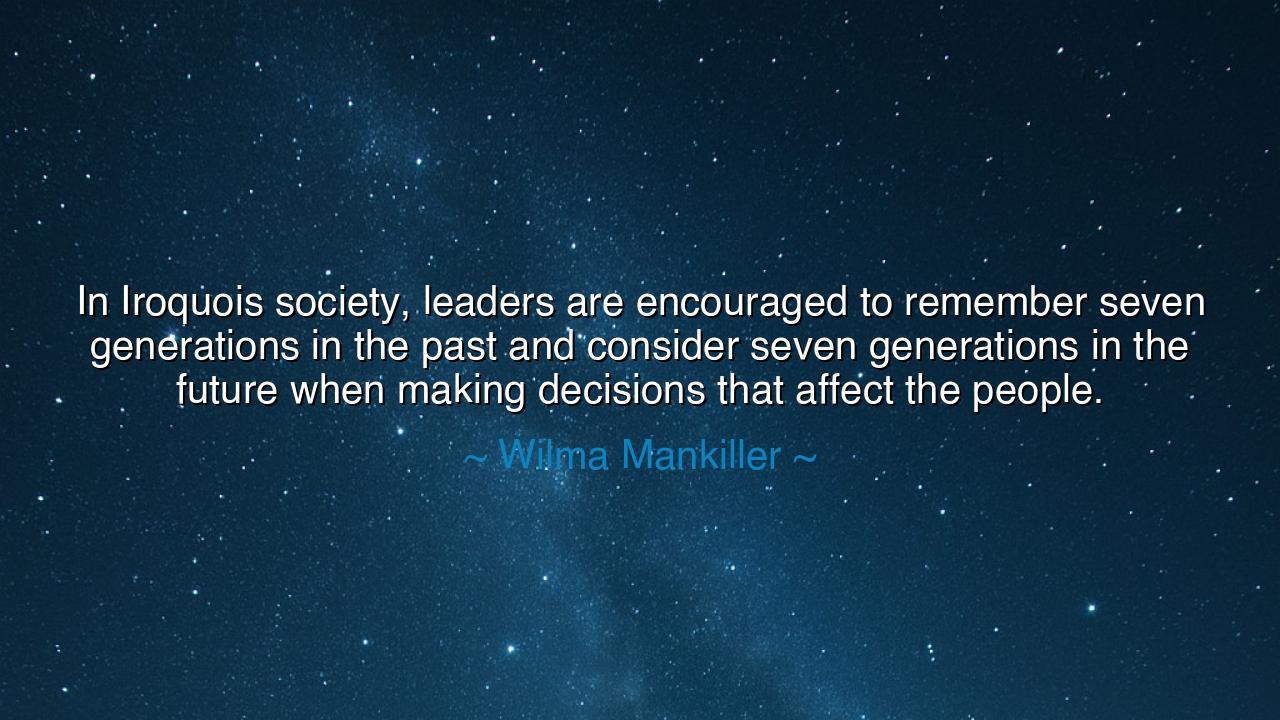
In Iroquois society, leaders are encouraged to remember seven
In Iroquois society, leaders are encouraged to remember seven generations in the past and consider seven generations in the future when making decisions that affect the people.






"In Iroquois society, leaders are encouraged to remember seven generations in the past and consider seven generations in the future when making decisions that affect the people." These words by Wilma Mankiller carry a profound message that speaks to the heart of wisdom, responsibility, and long-term thinking. In the ancient wisdom of the Iroquois—a people whose deep respect for the earth and each other shaped their way of life—there is an understanding that true leadership is not merely about the present moment, but about honoring both the past and the future. The decisions we make today are not isolated; they ripple through time, affecting not just our own lives, but the lives of those who will come after us.
The concept of remembering seven generations in the past and considering seven generations in the future is a call to connect with the roots of our being and our shared humanity. It is a reminder that we stand upon the shoulders of our ancestors, who, through their struggles and triumphs, shaped the world we inherit. This principle invokes the ancient truth that history is not a distant, abstract thing; it is alive within us, shaping our values, our actions, and our identity. Just as the great tribal leaders of old understood the importance of preserving wisdom for future generations, so too must we honor the legacy of our forebears by making decisions that honor both their sacrifices and the potential of those who will walk this earth long after we are gone.
Consider the great ancient civilizations of Mesopotamia, Egypt, and Greece. Their leaders, although sometimes flawed, often took great care to record their deeds and the lessons they learned. They did not view their actions as fleeting, but as part of a larger narrative, one that would shape the future of their people. In Egypt, the Pharaohs built pyramids, monuments that were not only tombs but enduring symbols of their vision for the afterlife and the generations that would come. The Egyptians understood that their legacy was built not just for their own time but for future generations, whose lives and values would be shaped by the cultural and spiritual foundations they laid down.
In more recent times, we can look to the leaders of the American Revolution, such as George Washington and Thomas Jefferson, who understood that their decisions—whether to form a new nation or establish a government—were not merely for the moment, but for the posterity they believed would benefit from their actions. They too were guided by the principle that greatness lies in the future, that what we do today should be measured by how it shapes tomorrow. Their vision for the future was expansive, much like the Iroquois understanding of leadership: to consider not just the immediate consequences, but the long-term effects of their actions.
This mindset challenges us to step away from the immediacy of our daily lives, from the temptation to act purely for our own benefit or for the benefit of those around us, and to think of the world as something that must be nurtured for the benefit of future generations. The Iroquois did not see themselves as owners of the land, but as caretakers, and their understanding of leadership reflected that view. Leadership, in this context, is not about power but about stewardship—a responsibility to those who will follow us. To make decisions as if we are guardians of the world, entrusted with the welfare of those who will walk it after us, is the essence of wisdom.
In our modern world, this teaching remains as urgent as ever. As we face environmental crises, political instability, and social challenges, we are called upon to act with the understanding that our decisions today have a profound impact on those who will inherit our world. Just as the Iroquois leadership model encouraged them to consider the consequences of their actions on seven generations, so too must we think of the world we are leaving behind. Our actions—whether in the environment, technology, or social justice—should reflect a vision that looks beyond our immediate needs and seeks to preserve and enrich the world for those who will come after us.
The lesson here is clear: we must honor the past and serve the future. As we navigate the complexities of our lives, let us remember that we are part of a greater story, a story that began long before us and will continue long after. Let us not make decisions that only satisfy the immediate moment but seek to leave a legacy that will benefit future generations. We must act as caretakers, knowing that our time here is but a fleeting moment in the long arc of history. Like the great leaders of old, we are called to make decisions not just for ourselves but for those who will come after us, for it is in the service of others that we find true greatness. May we always remember seven generations in the past, and seven generations in the future, as we strive to make this world a better place for all who follow.






AAdministratorAdministrator
Welcome, honored guests. Please leave a comment, we will respond soon